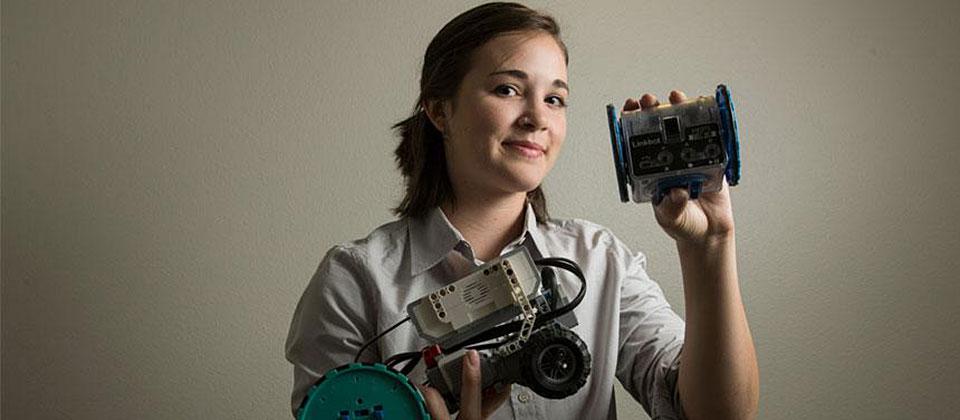
Hannah Maravelias
More information
Undergraduate, Biological Systems Engineering
Obvious signs in Hannah Maravelias’ youth signaled her future in engineering: The “mathlete” T-shirt that she often wore to school. The graveyard of disassembled appliances and electronics lying throughout her house—much to her parents’ dismay—because Maravelias wanted to understand how they worked.
The Redding, California, native continues to tinker, question and explore the world as a third-year student majoring in biological systems engineering at UC Davis. Outside of class, she works in an evolution and ecology research lab, studying the early development processes of fruit flies.
"It's really mind-blowing when you start to learn the mechanics of everything that's around you," says Maravelias.
No shrinking violet
Her experience as a woman in STEM at UC Davis has been overwhelmingly positive—Maravelias notes that the principal investigator and most of the researchers in the lab where she works are women. But she does observe a gender gap, more so in her upper-division courses. Maravelias views her minority status as an opportunity to become a leader and represent her gender.
“I’m competitive, and I like a challenge,” Maravelias said. “The gender gap was never something that made me shrink from my field, but I hope to see it decrease because not every woman feels that way.”
Inspiring young girls through GIRL Camp
Maravelias is helping bridge the gap by serving as a leader and mentor to young girls who are curious about STEM subjects. She’s the head coach of the UC Davis C-STEM Girls in Robotics Leadership (GIRL) Camp program, which uses robotics to teach middle school girls about C-STEM concepts, such as coding, in a non-intimidating, fun way. GIRL Camp is the brainchild of Harry Cheng, director of the UC Davis Center for Computing and STEM Education and a professor of mechanical and aerospace engineering.
"We want girls to feel comfortable and confident to enter whatever field they want."
The free, one-week camps are offered at UC Davis and many other locations in California, as well as in Cincinnati. Each camp has two coaches, two assistant coaches and 20 campers. In addition to academic programming, the coaches and campers discuss what it means to be a leader and a woman in C-STEM, and how to recognize and address gender stereotypes.
As head coach, Maravelias helps oversee all the camps. In 2017, she helped rewrite the program’s curriculum and also coached at the UC Davis camp.
“We emphasize at the end of the day that if this isn’t what they love, that’s OK. We want girls to feel comfortable and confident to enter whatever field they want,” Maravelias says.
A key aspect of GIRL Camp is problem-solving. At the beginning of the week, campers are asked to select a global problem, such as hunger or pollution, and then use their robots to solve it. They put together a video and present their work to their friends and family at the end of the week.
“It’s fun to see them shy and reserved in the beginning of the week, and then at the end looking like they’re on top of the world in front of their parents,” Maravelias says.
Fearless future for women in STEM
The future of GIRL Camp looks bright and fearless, with more camp locations on the way in 2018 and the formation of an advisory board. Maravelias is currently working on curriculum for C-STEM GIRL+ Camp, an advanced-level camp for high school students that launches this summer. She says she’s excited to see the program grow and gain momentum, especially at the grassroots level.
"No one thinks they can cut it, and women face that fear a little bit more, because they grow up with the schema in their heads that this isn’t the most acceptable route."
“Two of our GIRL Camp assistant coaches have started robotics clubs at their high schools and are showing younger girls how to code,” says Maravelias. “They’re starting their own C-STEM communities.”
Looking to her own future, Maravelias would like to work for an engineering firm specializing in clean energy. Not surprisingly, she wants a hands-on role—creating, designing and watching what she builds go into practice. She’s says she absolutely loves what she’s doing, and she encourages her campers to do the same—go after what they really want to do and worry about the rest later.
“No one thinks they can cut it, and women face that fear a little bit more, because they grow up with the schema in their heads that this isn’t the most acceptable route,” Maravelias says. “But if you’re willing to give it everything you have, you’ll make it through.”
Learn more about C-STEM GIRL Camp and GIRL+ Camp on Facebook, Instagram and Twitter.